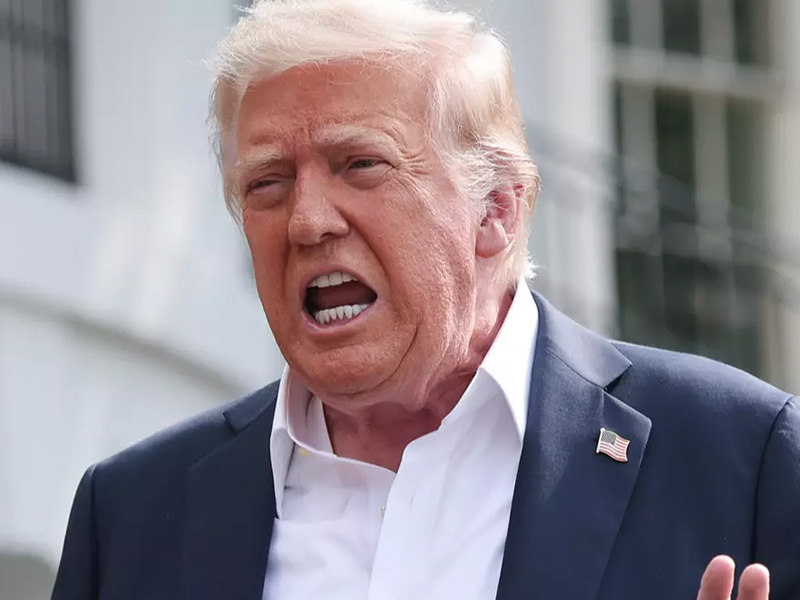World
Trump Implements $100,000 Annual Fee for H-1B Visa Applicants

US President Donald Trump has enacted an executive order that imposes a $100,000 annual fee on applicants for the H-1B visa program, which permits skilled foreign workers to work in the United States. This order, effective from September 21, 2023, aims to address what the administration describes as “abuse” of the program and requires this fee to be paid before entry is granted.
The new fee specifically targets new applications, meaning existing visa holders will not be affected. However, companies will face the financial burden of paying the fee for each applicant over the course of six years. U.S. Commerce Secretary Howard Lutnick emphasized the decision companies must make regarding the value of potential hires, stating, “The company needs to decide… is the person valuable enough to have a $100,000-a-year payment to the government, or they should head home, and they should go hire an American.”
Until now, H-1B visa applications involved administrative fees totaling around $1,500. The annual cap for H-1B visas has been set at 85,000 since 2004. However, according to the U.S. Citizenship and Immigration Services (USCIS), applications have declined to approximately 359,000 for the upcoming fiscal year, marking the lowest number in four years.
Reactions to the executive order have been swift and critical. Immigration attorney Tahmina Watson warned that the new fee could be a “nail in the coffin” for many small businesses and start-ups. She commented, “Almost everyone’s going to be priced out. This $100,000 as an entry point is going to have a devastating impact.”
Jorge Lopez, chair of immigration and global mobility at Littler Mendelson PC, echoed these concerns. He cautioned that the measure “will put the brakes on American competitiveness in the tech sector and all industries,” suggesting that some companies may explore expansion opportunities outside the United States.
Major technology companies such as Amazon, Microsoft, Meta, Apple, and Google have been significant beneficiaries of the H-1B program. Critics argue that these visas undermine opportunities for American workers, while supporters, including notable figures like Elon Musk, contend they are essential for attracting top global talent.
In addition to the H-1B changes, Trump introduced a “gold card” visa aimed at fast-tracking immigration for select applicants, with fees starting at £1 million. The debate surrounding H-1B visas has long polarized Trump’s allies. While campaigning, Trump promised to simplify the process of attracting foreign talent, even suggesting green cards for international graduates. Yet, earlier in his presidency, he instituted stricter scrutiny on H-1B applications, leading to a peak rejection rate of 24% in 2018.
Concerns are particularly pronounced in India, which is the largest source of H-1B applications. Businesses in India fear that the new restrictions will further limit opportunities for skilled professionals seeking employment in the United States.
As the implications of this executive order unfold, the landscape for skilled foreign workers in the U.S. may face significant changes, prompting a reevaluation of hiring strategies among American companies.
-

 Health3 months ago
Health3 months agoNeurologist Warns Excessive Use of Supplements Can Harm Brain
-

 Health3 months ago
Health3 months agoFiona Phillips’ Husband Shares Heartfelt Update on Her Alzheimer’s Journey
-

 Science1 month ago
Science1 month agoBrian Cox Addresses Claims of Alien Probe in 3I/ATLAS Discovery
-

 Science1 month ago
Science1 month agoNASA Investigates Unusual Comet 3I/ATLAS; New Findings Emerge
-

 Science1 month ago
Science1 month agoScientists Examine 3I/ATLAS: Alien Artifact or Cosmic Oddity?
-

 Science1 month ago
Science1 month agoNASA Investigates Speedy Object 3I/ATLAS, Sparking Speculation
-

 Entertainment5 months ago
Entertainment5 months agoKerry Katona Discusses Future Baby Plans and Brian McFadden’s Wedding
-

 Entertainment4 months ago
Entertainment4 months agoEmmerdale Faces Tension as Dylan and April’s Lives Hang in the Balance
-

 World3 months ago
World3 months agoCole Palmer’s Cryptic Message to Kobbie Mainoo Following Loan Talks
-

 Science1 month ago
Science1 month agoNASA Scientists Explore Origins of 3I/ATLAS, a Fast-Moving Visitor
-

 Entertainment2 months ago
Entertainment2 months agoLewis Cope Addresses Accusations of Dance Training Advantage
-

 Entertainment3 months ago
Entertainment3 months agoMajor Cast Changes at Coronation Street: Exits and Returns in 2025









